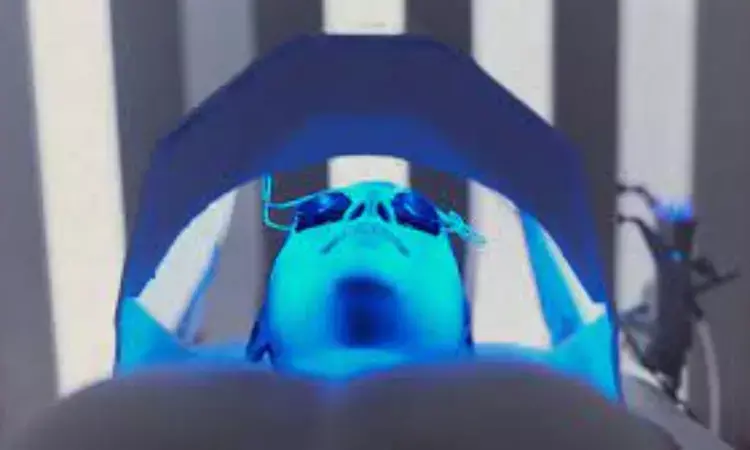- Home
- Medical news & Guidelines
- Anesthesiology
- Cardiology and CTVS
- Critical Care
- Dentistry
- Dermatology
- Diabetes and Endocrinology
- ENT
- Gastroenterology
- Medicine
- Nephrology
- Neurology
- Obstretics-Gynaecology
- Oncology
- Ophthalmology
- Orthopaedics
- Pediatrics-Neonatology
- Psychiatry
- Pulmonology
- Radiology
- Surgery
- Urology
- Laboratory Medicine
- Diet
- Nursing
- Paramedical
- Physiotherapy
- Health news
- Fact Check
- Bone Health Fact Check
- Brain Health Fact Check
- Cancer Related Fact Check
- Child Care Fact Check
- Dental and oral health fact check
- Diabetes and metabolic health fact check
- Diet and Nutrition Fact Check
- Eye and ENT Care Fact Check
- Fitness fact check
- Gut health fact check
- Heart health fact check
- Kidney health fact check
- Medical education fact check
- Men's health fact check
- Respiratory fact check
- Skin and hair care fact check
- Vaccine and Immunization fact check
- Women's health fact check
- AYUSH
- State News
- Andaman and Nicobar Islands
- Andhra Pradesh
- Arunachal Pradesh
- Assam
- Bihar
- Chandigarh
- Chattisgarh
- Dadra and Nagar Haveli
- Daman and Diu
- Delhi
- Goa
- Gujarat
- Haryana
- Himachal Pradesh
- Jammu & Kashmir
- Jharkhand
- Karnataka
- Kerala
- Ladakh
- Lakshadweep
- Madhya Pradesh
- Maharashtra
- Manipur
- Meghalaya
- Mizoram
- Nagaland
- Odisha
- Puducherry
- Punjab
- Rajasthan
- Sikkim
- Tamil Nadu
- Telangana
- Tripura
- Uttar Pradesh
- Uttrakhand
- West Bengal
- Medical Education
- Industry
Combo of Needle-free jet injection of metronidazole and blue light therapy can safely treat facial acne

China: Acne vulgaris, a chronic inflammatory skin disease, is one of the most common dermatological conditions observed in the clinic. Some topical acne treatments used in combination, such as blue light and topical antibiotics such as metronidazole by needle-free jet injection (NFJI), are becoming common in clinical practice, but the efficacy remains unknown.
In research featured in the Journal of Cosmetic Dermatology, Jianyun Lu from the Departments of Dermatology in The Third Xiangya Hospital, Central South University, Changsha, China, and colleagues sought to investigate the effect of blue light combined with metronidazole by needle-free jet injection in acne treatment.
They found that a combination of metronidazole by NFJI has a synergistic effect and can ease skin lesions within six weeks for the treatment of moderate and moderate–to–severe facial acne vulgaris, and the method also demonstrated good safety.
Acne is a chronic inflammatory skin disease and the clinic's most common skin disorder. Treatment goals comprise reduction of psychological morbidity, scar prevention, and lesion resolution. In some people, using oral and topical treatments can be limited due to inconvenience, side effects, ineffectiveness, or poor tolerability. Some studies have suggested promising results for light therapies.
Blue light is reported to be the most common acne treatment. It was approved in 2002 by the US Food and Drug Administration (FDA), as it has anti-inflammatory properties and decreases Propionibacterium acnes level. Also, it has been used in combination with pharmacological and physical measures for effect synergization and optimizes the therapeutic outcome. Topical use of metronidazole is effective for treating P. acnes and Demodex mite and has additional l anti-inflammatory activity and lesser side effects than oral administration. Needle-free transdermal jet injection is the noninvasive injection of a drug solution through a high-pressure liquid injection instrument.
Against the above background, Dr Jianyun and colleagues observed the efficacy of MNZ administered by NTJI. They combined it with blue light irradiation to identify a more tolerable, convenient, and safer method of using NTJI in acne treatment.
For this purpose, the researchers enrolled 251 patients; they were randomly assigned into the metronidazole (MNZ) group, the blue light group, and MNZ + blue light group and then received treatment for six weeks. They used various objective and subjective methods to evaluate the efficacy and side effects of the treatments. Methods included skin barrier physiological parameters, clinical pictures, acne lesion count assessment, the Investigator's Global Assessment score, Patients' Self-Assessment, and VAS score.
The authors reported the following findings:
- Compared to the baseline, the MNZ + blue light group showed significant improvement in acne lesion count reduction, TEWL, straum corneum hydration, facial surface sebum and erythema.
- The MNZ + blue light group showed significant differences compared to the MNZ and blue light groups in acne lesion count reduction and erythema.
- The MNZ + blue light group demonstrated significant improvement in TEWL and sebum compared to the MNZ group.
- While compared to the blue light group, the MNZ + blue light group showed significant improvement in hydration.
- The authors did not observe any statistically significant difference among the three groups in pigmentation.
"Metronidazole by needle-free jet injection combined with blue light for the treating moderate-to-severe facial acne has a synergistic effect and can alleviate acne skin lesions within a short term (approximately six weeks)," the authors wrote. "Also, this combination has good tolerance and compliance."
Reference:
Yi L, Gao L, Lv L, Zhang B, Chen F, Yang F, Yan W, Jiang L, Li N, Lao Y, Lu J, Huang X. Therapeutic efficacy of metronidazole by needle-free jet injection combined with blue light therapy in Moderate-to-Severe facial acne vulgaris. J Cosmet Dermatol. 2022 Oct 8. doi: 10.1111/jocd.15442. Epub ahead of print. PMID: 36208057.
Dr Kamal Kant Kohli-MBBS, DTCD- a chest specialist with more than 30 years of practice and a flair for writing clinical articles, Dr Kamal Kant Kohli joined Medical Dialogues as a Chief Editor of Medical News. Besides writing articles, as an editor, he proofreads and verifies all the medical content published on Medical Dialogues including those coming from journals, studies,medical conferences,guidelines etc. Email: drkohli@medicaldialogues.in. Contact no. 011-43720751


